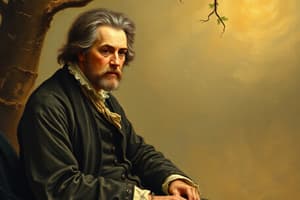Podcast
Questions and Answers
According to Rousseau, what did he believe about people?
According to Rousseau, what did he believe about people?
- People are naturally corrupt
- People are naturally selfish
- People are naturally evil
- People are naturally good (correct)
What did people during the Enlightenment value over blind acceptance?
What did people during the Enlightenment value over blind acceptance?
- Authority
- Tradition
- Religion
- Reason (correct)
What did the Enlightenment thinkers question?
What did the Enlightenment thinkers question?
- Their own beliefs
- The authority of their leaders (correct)
- The existence of God
- The natural world
True or false: Rousseau believed that people were naturally corrupt and needed strict rules to maintain order?
True or false: Rousseau believed that people were naturally corrupt and needed strict rules to maintain order?
True or false: The Enlightenment thinkers valued reason and logical thinking over blind acceptance?
True or false: The Enlightenment thinkers valued reason and logical thinking over blind acceptance?
True or false: The concept of the social contract is about people giving up some freedoms in exchange for the government looking out for their well-being?
True or false: The concept of the social contract is about people giving up some freedoms in exchange for the government looking out for their well-being?
Match the following Enlightenment thinkers with their key ideas:
Match the following Enlightenment thinkers with their key ideas:
Match the following activities with their objectives:
Match the following activities with their objectives:
Match the following Enlightenment concepts with their definitions:
Match the following Enlightenment concepts with their definitions:
What was Rousseau's idea of the social contract?
What was Rousseau's idea of the social contract?
What did people during the Enlightenment value over blind acceptance?
What did people during the Enlightenment value over blind acceptance?
Name three activities that can be done to explore and showcase the spirit of the Enlightenment.
Name three activities that can be done to explore and showcase the spirit of the Enlightenment.
Flashcards are hidden until you start studying




